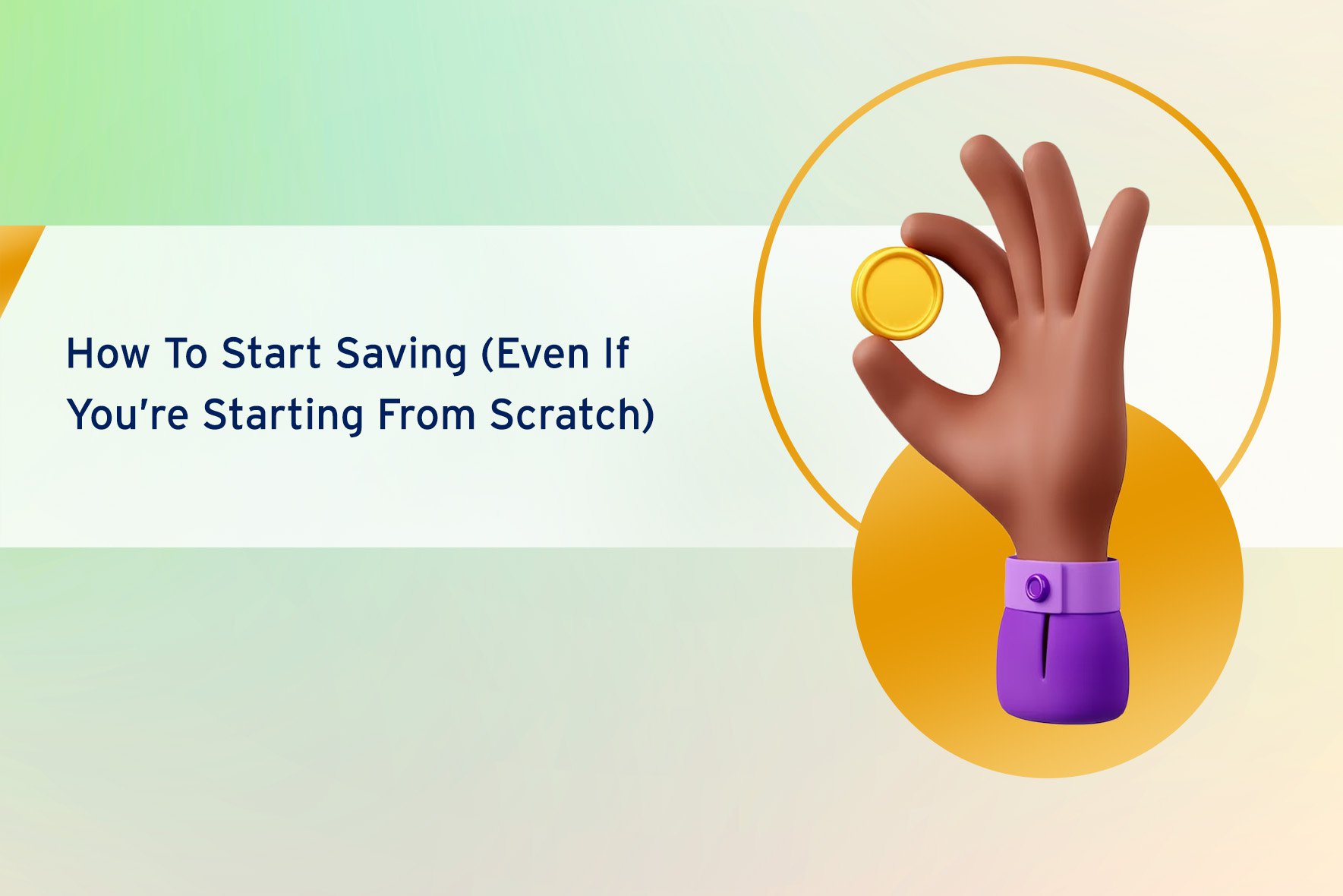
How to Start Saving (Even if You’re Starting From Scratch)
Author Taiwo Temitope-Adesope
They say getting started is the hardest part of any venture, and this also applies when you decide to start saving; especially when you’re starting from scratch.
Now that you are ready to start saving your money, understand that every step, no matter how small, is a step in the right direction.
In today’s world, having a financial safety net is no longer up for debate. If the last couple of years has taught us one thing about managing money, it’s that having some savings set aside is crucial.
How saving money affects your life
Research has proven that people who save money lead happier lives.
There are many ways in which your lifestyle improves when you decide to start saving. What’s vital is to do it in a way that makes saving money seem like a fun and rewarding experience.
You can set up a savings account, set up a budget and stick to it, or find creative ways to save money on everyday expenses. Whatever method you choose, remember, saving money can be a rewarding experience.
Some of the benefits will enjoy when you start saving money from scratch include.
● Financial independence
There is a certain level of independence that being in control of your finances gives you.
Financial independence is the ability to live without depending on others for financial support. It also empowers you to weather unexpected financial challenges, such as job loss or medical emergencies.
● Debt-free life
Living a life free of debt means you are not paying interest on debt, which will save you a lot of money over time. Also, debt-free living offers a better financial future, reduces stress, and allows you to enjoy life more.
● Happy retirement
Not many people get to retire and live happy lives. Saving money for retirement is important because it allows you to have a comfortable life after you retire.
● Achieve long-term financial goals
Even if you start saving from scratch, you still stand a high chance of achieving your long-term financial goal. The trick is to start than now.
Saving allows you to set aside money for future expenses, such as a down payment on a house, saving for a university fund, saving for a new car, or a holiday trip.
You just must exercise discipline.
● Investing
Saving is a form of investment that allows you to grow your money over time. By putting your money in an interest-bearing account, you are essentially putting your money into something that has the potential to grow.
It’s a great way to build your wealth over time.
● Safety net
In a situation where you lose your job or run into one unfortunate event or the other, you may have to rely on your savings to cover your living expenses.
For instance, you have an injury. You may need your savings to cover your medical expenses and lost income. Having savings helps you weather a difficult temporary situation and avoid going into debt.
How much of your income should go into savings?
This question has got a lot of savers overworking their brains, but you don’t need to chart a graph to know how much of your income should go into your savings account.
The 50-30-20 budgeting rule can help you determine how much of your income should be saved.
Simply put, you are advised to save 20% of your income every month.
The 50-30-20 strategy suggests that you allocate 50% of your pay cheque toward the things you need, 30% toward the things you want, and 20% toward savings and investments.
Another rule is the 80/20 rule which dictates that you save 20% and dedicate the other 80% to your essential needs.
No matter which rules you choose to follow, be sure to find a flexible balance between saving and spending.
How to start saving from scratch
For many Nigerians, saving money doesn’t come naturally. 2021 data showed that Nigerians generally have a poor savings culture.
Some factors responsible for this include poverty arising from low income and unemployment.
Many Nigerians willing and able to work are unemployed, thus, they do not earn any income and find it difficult to save. To worsen the situation, the minority who work are overburdened.
Nevertheless, having savings, even though little, is a must.
Not only can your savings help you avoid loans and other forms of debt in the event of unexpected expenses, but it can also help you reach your financial goals.
If you are serious about saving money, especially if you are starting from scratch, the following tips will guide you.
1. Set a specific goal
You may be tempted to open a savings account and dump all your spare change into it. But it’s only a matter of time before you run into an emergency and max it out.
By setting a specific goal, you exercise more discipline. Start with a small goal. Something like a home appliance.
Meeting that goal will give you the kick you need to launch into something bigger and more long-term.
2. Budget for savings.
This one is for salary earners. Just because you decide to save doesn’t mean it’s going to happen.
To make headway in your desire to save money, dedicate a portion of your paycheque monthly towards that goal.
If you don’t have a budget or a spending plan, sit down and write one out.
Just as you include a line item for each of your monthly bills, also include a line item for saving, and don’t allow yourself to spend it on anything else.
3. Keep separate accounts.
It is advisable to open a savings account at a different bank from where your other accounts are located. Especially if you spend on impulse. When your savings aren’t easily accessible, you’re less likely to dip into them unnecessarily.
4. Automate your savings
One of the best ways to stay on the savings course is to schedule your main account to make automatic deposits into your savings account.
That way, you will not forget to deposit money into your savings account each week or month. It also makes it almost impossible for you to spend the money you were meant to save.
5. Keep track
It’s always exciting to set a goal and see your hard work pay off as you build toward it. However, when you start seeing your savings account balance grow, it can be tempting to dip into it to pay bills or splurge on something you want.
Commit to leaving the money there and using it only for emergencies or whatever financial goal it was intended.
Keep track of your account and your progress toward your goal.
Tips for opening a savings account.
Opening a high-interest savings account in 2023 may appear pretty straightforward but with the following tips, your journey to financial freedom is made easier.
● Shop for the best rates
Looking to beat the high cost of living with your savings? Moving to a high-yield savings account that is separate from your primary bank is your best bet. Visit nairaCompare to compare interest rates and select the savings account that is best for you.
● Choose the institution that works for you
After you’ve identified the rates you can find from the top-paying savings account institutions, it’s time to make the right choice for you.
Some of the factors you may want to consider here include the convenience of online banking, ease of account opening, ease of making deposits, and others.
● Complete the application
The next step after deciding which institution to use for your new savings account is completing the application.
Most likely you will do this online. In most cases, it should only take 10 minutes or so.
Some of the requirements for opening a high-yield savings account include.
● Your full name
● Address
● Telephone number
● Email address
● Bank Verification Number (BVN)
● Valid means of identification (Driver’s license, international passport, or other government-issued photo ID)
● Proof of residence (Utility bill)
● Fund your new account
Some institutions require you to set up an electronic transfer of funds from an outside account into your new account immediately during the application process to fund the minimum initial deposit.
Others either won’t have a minimum deposit amount or will allow you to open the account first and fund it later.
A transfer from another bank is the most common means of funding a new savings account, but some institutions will offer you the option of making a direct deposit over the counter.
● Enrol in online banking and download the app
After opening your account, you’ll want to enrol in online banking for that institution.
Sometimes you’ll be able to do that right away after completing your online application. For other banks, you may have to wait a few days until you get an email or letter with the account information you’ll need for online enrolment.
Be sure to note your username and password in a secure place or using password storage software.
Also, make sure to keep your login details secure so you don’t fall prey to hackers.
About Author

Taiwo Temitope-Adesope
Taiwo is a passionate storyteller and strategist dedicated to empowering women and crafting compelling narratives. A First-Class graduate in Mass Communication from Covenant University, she specializes in writing, public relations, and digital marketing. As a Content Manager at Suretree, she drove a 50% increase in web traffic through SEO and boosted website engagement by 60% in just four months. Her leadership experience includes serving as Public Relations Officer for the Covenant University Student Council and contributing to impactful volunteer initiatives. With expertise in strategic thinking and business acumen, Taiwo continues to create stories that inspire confidence and imagination.
.png?width=1615&height=444&name=nairaCompare%20Christmas%20logo%20(PNG).png)








